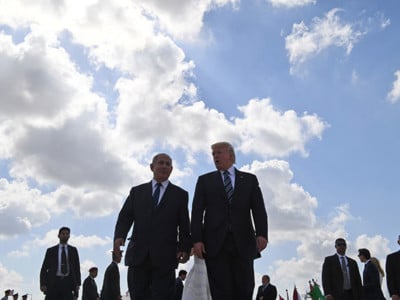Part of the Series
Human Rights and Global Wrongs
As Donald Trump threatens to further enmesh the U.S. in Israel’s war against Iran with direct strikes, legal experts warn that Israel’s attacks violate international law, and that U.S. attacks would violate constitutional and statutory law.
Israel began its war on Iran on June 12, with an attack that seemed intended to distract global attention from its genocide in Gaza. Since then, the Israeli regime has killed at least 11 top Iranian generals and struck nuclear sites and missile launchers, in addition to residential buildings and civilian infrastructure. By the fifth day, Israel had damaged Iran’s energy installations, nuclear infrastructure, command centers, and the state television station.
Iran has responded to the Israeli assault by shooting missiles into Israel, many of which have been intercepted by Israel’s “Iron Dome” system, which the U.S. helps fund and support. As of June 17, Iran’s health ministry reported that Israeli strikes had killed at least 224 people and wounded more than 1,800 in Iran. Independent observers place the death toll within Iran at over 600. At least 24 Israelis have been killed and about 600 wounded.
“The US provided the Israeli regime with [the] greenlight for its surprise attack on Iran, the distraction of feigned peace talks to facilitate the attack, US tax dollars to finance the operation, the intelligence for targeting, the weapons and ammunition for killing, the diplomatic cover to protect it from Security Council action, US forces to intercept the Iranian response, the promise of direct US military backing if Israel requires it, and now appears poised to join the Israeli regime in offensive operations,” former senior UN official Craig Mokhiber wrote on LinkedIn.
“Once again, the US is a co-perpetrator in Israel’s crimes, and corrupt US politicians and media corporations have dusted off the old ‘WMDs’ ruse to push the US into war for the Israeli regime,” Mokhiber added, referring to the lies used by the Bush administration to build support for the illegal U.S. war on Iraq in 2003.
Donald Trump continues to make ambiguous, cagey, and provocative statements about whether he will order direct military force against Iran. But the U.S. is already walking in lockstep with Israel.
“We now have complete and total control of the skies over Iran,” he wrote on June 17. “Iran had good sky trackers and other defensive equipment, and plenty of it, but it doesn’t compare to American made, conceived, and manufactured ‘stuff.’ Nobody does it better than the good ol’ USA.”
In another post, Trump wrote, “We know exactly where the so-called ‘Supreme Leader’ is hiding. He is an easy target, but is safe there — We are not going to take him out (kill!), at least not for now.” And in a third post, he demanded Iran’s “UNCONDITIONAL SURRENDER!”
Trump is reportedly considering joining Israel in its strikes on Iranian nuclear sites. Earlier this week, the U.S. military moved at least 30 tanker aircraft used to refuel jets and bombers from bases in the U.S. to Europe. The U.S. has also transferred F-16, F-22, and F-35 fighter jets to bases in the Middle East. And it deployed an aircraft carrier from the South China Sea toward the Middle East.
Ayatollah Ali Khamenei, Iran’s supreme leader, said, “Americans should know that any military involvement by the U.S. will undoubtedly result in irreparable damage to them.” Iran’s Ministry of Foreign Affairs spokesman Esmaeil Baghaei told Al Jazeera, “Any American intervention would be a recipe for an all-out war in the region.”
Legal experts warn that Israel’s attacks violate international law, and that U.S. attacks would violate constitutional and statutory law.
Although Israel has already done damage to Iran’s nuclear facilities, “the entire operation… really has to be completed with the elimination of Fordow,” Israeli Ambassador to the U.S. Yechiel Leiter told Fox News. Only the U.S. military has the capacity to take out Fordow Fuel Enrichment Plant, built deep into a mountain 20 miles away from the city of Qom. Some analysts say bombing Fordow would require the use of a 30,000 lb. Massive Ordnance Penetrator (“bunker buster” bomb) delivered by a B-2 stealth bomber, which only the U.S. possesses. Other reports suggest that only a nuclear weapon could take out the site.
Israel’s “Preemptive” Strikes Violate the UN Charter
Israeli Prime Minister Benjamin Netanyahu described Israel’s attacks on Iran as “preemptive” strikes to prevent Iran from imminently obtaining a nuclear weapon. But recent U.S. intelligence assessments concluded that Iran was not actively developing a nuclear weapon and was up to three years away from being able to obtain, target, and deliver one. International Atomic Energy Agency (IAEA) Director General Rafael Grossi confirmed that there is no evidence Iran is developing a nuclear weapon.
In March, Tulsi Gabbard, U.S. director of national intelligence, testified to Congress that the intelligence community “continues to assess that Iran is not building a nuclear weapon and Supreme Leader Khamenei has not authorized the nuclear weapons program he suspended in 2003.”
But when reporters confronted Trump with Gabbard’s testimony, Trump was in denial. “I don’t care what she said,” Trump declared. “I think they were very close to having one.”
Trump wrote on TruthSocial on June 16, “Simply stated, IRAN CAN NOT HAVE A NUCLEAR WEAPON. I said it over and over again! Everyone should immediately evacuate Tehran!”
Meanwhile, Israel does have a stockpile of nuclear weapons, and, unlike Iran, is not party to the Treaty on the Non-Proliferation of Nuclear Weapons, or NPT, which governs the use of such arms. “Israel reportedly maintains at least 90 nuclear weapons, but it’s the only nuclear power in the world that refuses to confirm or deny its arsenal,” Phyllis Bennis and Khury Petersen-Smith wrote in OtherWords. “While Iran has enriched uranium, it has no nuclear weapons and — despite Israeli claims — does not have a program to create one.”
Even if there was proof that Iran was pursuing a nuclear weapon, the use of armed force for “preemptive” purposes violates the United Nations Charter. Article 2 states, “All Members shall refrain in their international relations from the threat or use of force against the territorial integrity or political independence of any state, or in any other manner inconsistent with the Purposes of the United Nations.”
Israel Launched a War of Aggression Against Iran
Israel’s use of military force in Iran constitutes illegal aggression.
The definition of aggression appears in UN General Assembly Resolution 3314 of 1974. Aggression is defined as “the use of armed force by a State against the sovereignty, territorial integrity or political independence of another State, or in any other manner inconsistent with the Charter of the United Nations.” This definition has also been incorporated into the Rome Statute for the International Criminal Court. Aggression includes “the invasion or attack by the armed forces of a State of the territory of another State.”
In addition, the prohibition against waging wars of aggression has achieved the status of a “peremptory norm” of international law, also known as jus cogens. A peremptory norm does not allow any exemptions and it cannot be modified by law, according to the Vienna Convention of the Laws of Treaties. Article 53 says, “A peremptory norm of general international law is a norm accepted and recognized by the international community of States as a whole as a norm from which no derogation is permitted and which can be modified only by a subsequent norm of general international law having the same character.”
The only two exceptions to the charter’s prohibition on the use or threat of force are when a state acts in self-defense or when the Security Council authorizes the use of force, neither of which has occurred here. A state may use military force in individual or collective self-defense under Article 51 of the charter “if an armed attack occurs” against a state.
Countries may engage in individual or collective self-defense only after an armed attack. Iran had not mounted an armed attack against Israel or any other UN member state. Under the well-established Caroline case, there must exist “a necessity of self-defense, instant, overwhelming, leaving no choice of means, and no moment for deliberation.” There was no evidence that Iran was developing a nuclear weapon. Even if there was, the possession of a nuclear weapon is not grounds for an armed attack; indeed, Israel has 90 nuclear weapons.
Trump will reportedly decide whether to engage in direct military action against Iran in the next two weeks.
After Israel’s armed attack against Iran on June 12, Iran had the lawful right to act in self-defense under Article 51.
Trump Withdrew the U.S. From the Iran Nuclear Deal in 2018
Trump set the stage for Israel’s war on Iran by pulling out of the Iran nuclear deal in 2018.
In the 2015 Joint Comprehensive Plan of Action (JCPOA), Iran agreed to restrict its uranium enrichment and other nuclear activities. In return, the U.S. unfroze billions of dollars in Iranian assets as relief from punishing sanctions. Britain, France, Russia, China, Germany, the European Union, the U.S., and Iran were parties to the JCPOA.
Iran has consistently maintained that its nuclear program is only intended for peaceful purposes. The IAEA certified several times that Iran was complying with its obligations under the JCPOA.
Netanyahu, who considers Iran an “existential threat” to Israel, has long been gunning for war. During Trump’s first term, Netanyahu urged him to pull the U.S. out of the JCPOA, which Trump did in 2018.
One year after the U.S. withdrawal, Iran began to pull back from its commitments under the JCPOA, which allowed a party to abandon its obligations if another party was in noncompliance. Trump intensified the sanctions that had devastated Iran’s economy, impoverished the vast majority of Iran’s population, and impeded its ability to respond to the pandemic.
Iran began enriching uranium to greater levels after the JCPOA fell apart. But as the IAEA and U.S. intelligence agencies determined, Iran was nowhere near obtaining a nuclear weapon before Israel attacked it on June 12.
Forcible Regime Change Is Illegal
Israeli officials reportedly seek U.S.-supported regime change in Iran. They hope that Iran’s disaffected population will rise up against their repressive government in response to the Israeli aggression. But although about 80 percent of Iran’s 92 million people oppose Iran’s hardline religious leadership, only a “very small number” would support foreign calls for regime change, Nasser Hadian, a U.S.-educated political scientist who has taught at the University of Tehran as well as Columbia University, told the New Yorker’s Robin Wright.
Forcible regime change violates the Iranian people’s right to self-determination.
The UN Charter prohibits the use or threat of force against the territorial integrity or political independence of another nation. The charter enshrines the “principle of equal rights and self-determination of peoples,” that is, the right of peoples to decide their own government. And the International Covenant on Civil and Political Rights (ICCPR), which both Israel and Iran have ratified, also guarantees the right to self-determination.
U.S. Participation in Israel’s Aggression Violates the “Declare War Clause” and the War Powers Resolution
Direct U.S. military involvement in Israel’s aggression against Iran would violate both the Declare War Clause of the U.S. Constitution and the War Powers Resolution.
In Article 1, section 8, clause 11, the Constitution reserves to Congress, and only Congress, the power to declare war.
U.S. involvement in Israel’s attacks on Iran violates the War Powers Resolution, which Congress enacted in 1973 to reclaim its constitutional authority to send U.S. troops into combat after the disastrous Vietnam War. The War Powers Resolution allows the president to introduce U.S. Armed Forces into hostilities or imminent hostilities only in three situations: where Congress has declared war; if there is an attack on U.S. territory, possessions, or armed forces; or when Congress has given authorization. None of these apply now.
Days after Israel began attacking Iran, Representatives Thomas Massie (R-Kentucky) and Ro Khanna (D-California) introduced a bipartisan bill in the House, and Sen. Tim Kaine (D-Virginia) introduced a joint resolution in the Senate, which say: “Congress hereby directs the President to terminate the use of United States Armed Forces for hostilities against the Islamic Republic of Iran or any part of its government or military, unless explicitly authorized by a declaration of war or specific authorization for use of military force against Iran.”
On June 16, Sen. Bernie Sanders (I-Vermont) introduced the No War Against Iran Act to prevent the Trump administration from using federal funds for a military attack on Iran unless Congress explicitly authorizes it. The bill states that “no federal funds may be obligated or expended for any use of military force in or against Iran” unless Congress declares war or enacts “specific statutory authorization for such use of military force.”
Israel’s Aggression Against Iran May Well Backfire
Trump will reportedly decide whether to engage in direct military action against Iran in the next two weeks. “Based on the fact that there’s a substantial chance of negotiation that may or may not take place with Iran in the near future, I will make my decision whether or not to go in the next two weeks,” Trump said in a statement read aloud by White House Press Secretary Karoline Leavitt at a press briefing on June 19. But Leavitt added that Iran must agree to cease all enrichment of uranium and must not develop a nuclear weapon. Iran is not likely to agree to the complete cessation of uranium enrichment.
Meanwhile, Israeli aggression may delay but won’t prevent Iran from developing nuclear weapons. “The illegal attack by Israel, a nuclear-armed state, against the Iranian leadership and nuclear sites may somewhat delay but cannot prevent Iran from acquiring nuclear weapons and is likely to have the opposite effect,” the Arms Control Association stated.
Wendy Sherman, who led the U.S. delegation that negotiated the 2015 JCPOA, concurs. She told Wright from the New Yorker that Israel’s eradication of Iran’s military leaders may harm Iran’s efforts “but it is not a strategy for ending Iran’s program.”
Israel’s attacks on Iran are already proving to work against U.S. interests. Iran has the third largest oil reserves in the world. In the first 24 hours after June 12, the price of U.S. crude oil rose by 7 percent. Iran, which controls the Straits of Hormuz, through which one-fifth of global energy supplies pass every day, could close or mine the Straits, plunging international energy markets into turmoil.
There are more than 40,000 U.S. active-duty troops and civilians working for the Pentagon in the Middle East, based in Iraq, Bahrain, Kuwait, Qatar, and the United Arab Emirates. Weapons and military equipment worth billions of dollars are stored in the region. Those U.S. persons and assets could be vulnerable if Trump joins Netanyahu in attacking Iran’s nuclear facilities.
In an urgent statement condemning Israeli aggression in Iran, the International Association of Democratic Lawyers (IADL) stated:
We urge states to immediately implement a two-way arms embargo on Israel; commit to implementing the International Criminal Court warrants against Netanyahu and Gallant, rather than continuing to provide them with impunity; join and bring new cases at the International Court of Justice against Israel; not to provide any political or logistical support for Israeli or US acts of aggression or war crimes against Iran or any other country; and to provide all forms of assistance as requested by the Islamic Republic of Iran, Palestine, and other nations subjected to Israeli aggression and genocide.
IADL also urged nonstate parties, human rights groups, lawyers, and legal organizations around the world to use domestic and international law and courts to hold Israeli and U.S. officials and soldiers accountable for their unlawful aggression against Iran and their acts of genocide in Palestine. IADL advocated documentation of these crimes and support for and defense against state repression of antiwar movements.
Urgent appeal for your support: Help us fight political repression.
Truthout urgently appeals for your support. Under pressure from an array of McCarthyist anti-speech tactics, independent journalists at Truthout face new and mounting political repression.
We rely on your support to publish movement journalism — in fact, we’re almost entirely funded by readers like you. Yet, donations are down at this moment of crisis. We may end this month in the red without additional help, so we’ve launched a fundraiser.
We have 6 days to hit our $36,000 goal. Please contribute a tax-deductible gift to Truthout at this critical moment.
Read full article at source
Stay informed about this story by subscribing to our regular Newsletter


